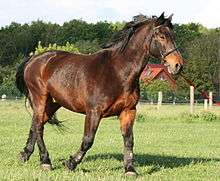Latvian horse
 | |
| Distinguishing features | |
|---|---|
| Alternative names | |
| Country of origin | Latvia |
| Notes | |
| Conservation status (FAO, 2007): endangered-maintained[6] | |
| Equus ferus caballus | |

The Latvian Horse (Latvian: Latvijas šķirne, "Latvian breed") is a purpose-bred warmblood horse breed from Latvia. Breeding began in Latvia in the early twentieth century,[2] and a herd book was established in 1927.[1] The breed was officially recognised in 1952. There are two types, sometimes called the Latvian Harness Horse[3] and the Latvian Riding Horse.[5] The harness type was predominant until about 1960, when demand for sport horses increased and more of the saddle type were bred.[2]
History
The origins of the Latvian breed go back to 1856, when western European horses were cross-bred with native Latvian horses. In 1890 planned breeding was begun from ten different breeds,[1] principally Hanoverian and Oldenburger, with some Holsteiner influence. More than 100 Oldenburgers (65 stallions and 42 mares) were imported from Germany and the Netherlands between 1920 and 1941, and these were the basis of the breed, which was officially recognised in 1952.[2] From about 1960[2] or 1970,[5] Hanoverian, Arab and some Thoroughbred blood was used to create a lighter sport horse type, the Latvian Riding Horse.[2][5]
References
- 1 2 3 4 5 6 7 8 Breed data sheet: Latvijas šķirne/Latvia. Domestic Animal Diversity Information System of the Food and Agriculture Organization of the United Nations. Accessed October 2014.
- 1 2 3 4 5 6 7 8 N.G. Dmitriev, L.K. Ernst (1989). Animal genetic resources of the USSR. FAO animal production and health paper 65. Rome: Food and Agriculture Organization of the United Nations. ISBN 9251025827. p. 316–17.
- 1 2 Breed data sheet: Latvian Harness/Ukraine. Domestic Animal Diversity Information System of the Food and Agriculture Organization of the United Nations. Accessed October 2014.
- ↑ Breed data sheet: Latvian Draught/Belarus. Domestic Animal Diversity Information System of the Food and Agriculture Organization of the United Nations. Accessed October 2014.
- 1 2 3 4 Elwyn Hartley Edwards (1994). The encyclopedia of the horse. London; New York; Stuttgart; Moscow: Dorling Kindersley. ISBN 0751301159. p. 276.
- ↑ Barbara Rischkowsky, D. Pilling (eds.) (2007). List of breeds documented in the Global Databank for Animal Genetic Resources, annex to The State of the World's Animal Genetic Resources for Food and Agriculture. Rome: Food and Agriculture Organization of the United Nations. ISBN 9789251057629. Accessed October 2014.
.jpg)